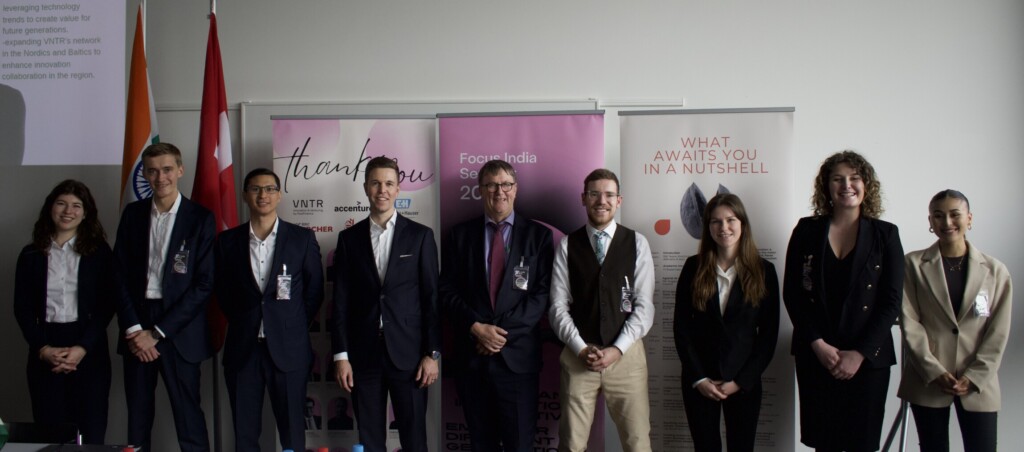 Seminar in Switzerland 2024 – Day 4
Seminar in Switzerland 2024 – Day 4
The fourth day began with a presentation and speech by Fabian Dreier and Jean-Michel Ah Kong from Endress+Hauser. They shared the challenges they face, and we applied our 3E approach to work on case studies, presenting the results afterward. Following lunch, we engaged in a highly interactive workshop with VNTR by Postfinance, gaining valuable insights into their work, challenges, and tasks. To conclude this action-packed day, we participated in another yoga session that centered us and provided renewed energy for the upcoming final day.
Overview Day 4
- Workshop on our 3E approach with Endress+Hauser
- Workshop with VNTR by Postfinance about sustainable urban development
- Yoga Session
Workshop on our 3E approach with Endress+Hauser
Our seminar with Endress+Hauser covered an insightful journey through the «3 E’s,» focusing on the company’s motivations, current operations, and forward-looking strategies. The seminar began with an introduction that highlighted why Endress+Hauser is a significant player in its field and what drives their team towards excellence. A brief overview of the company set the stage for deeper discussions.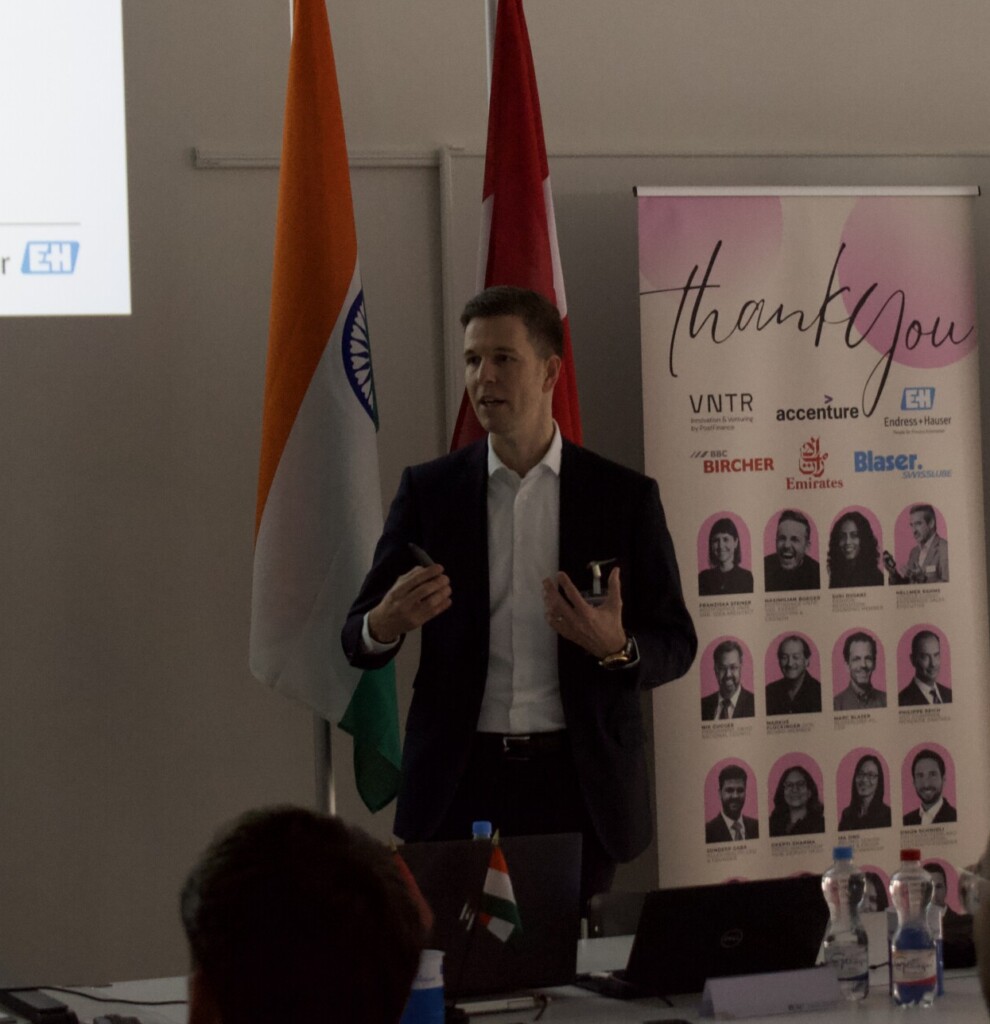
The core of the seminar addressed current and future global supply chain (SC) challenges, identifying key areas of concern such as changes in supply markets including trade barriers, customs, and embargoes, as well as the availability of raw materials. It emphasized the importance of risk management and independence, the benefits of extended cooperation, the critical nature of sustainability, and the impact of costs related to raw materials, energy, and logistics. Additionally, the challenges posed by short innovation and redesign cycles were discussed, highlighting the dynamic nature of the industry.
Looking ahead, the Flow Supply Chain Strategy 2027 was presented, outlining Endress+Hauser’s commitment to striving for excellence with a particular focus on sustainability, digitalization, and supply chain management. This strategy emphasizes the importance of innovation and adaptability in meeting future demands and overcoming challenges.
The seminar also included workshops on various topics, aiming to foster deeper understanding and skill development among participants. These workshops covered:
1. Unleashing the potential of different cultures, emphasizing the value of diversity and inclusion.
2. Enhancing innovation and creativity, focusing on fostering an environment where new ideas can flourish.
3. Enabling digital transformation, highlighting the importance of integrating digital technologies into business processes to improve efficiency and competitiveness.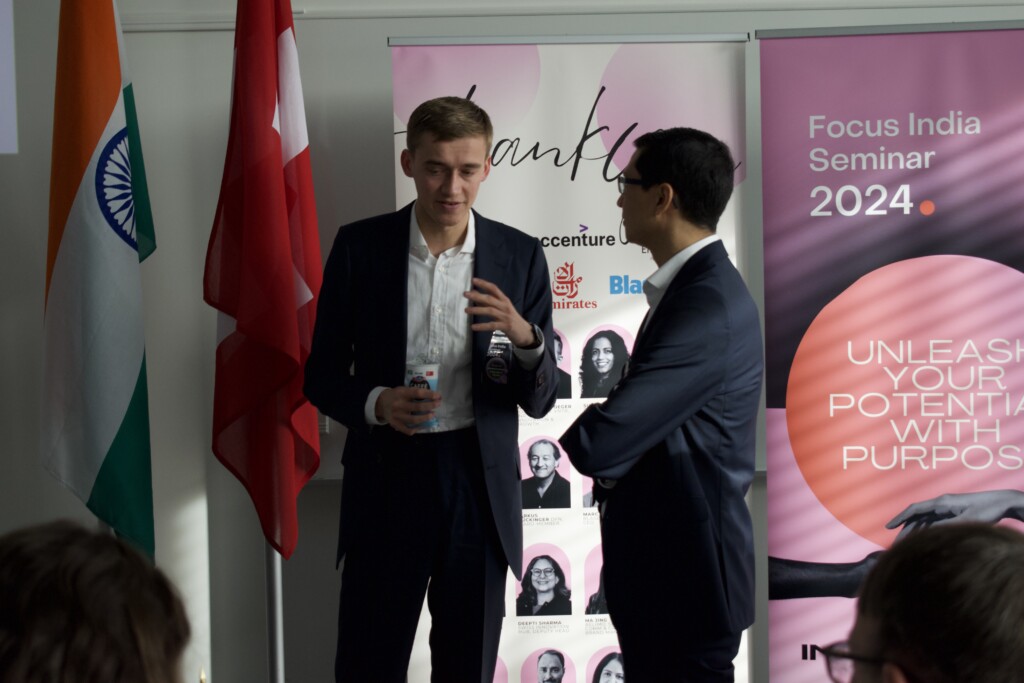
During the workshop six important factors were mentioned, which should be considered when doing business in India. One Aspect is to analyze local environment with the PERSTEL model. Another one is the need to be close to your partners while stablishing a local team. In addition, the team spirit must be lived. Moreover, physical presence is key to creating bonds with employees. Bonding is a very powerful tool when it comes to leadership. Furthermore, the flexibility and creativity of India (incredible India) should be used. Lastly, supporting business partners when it comes to investments with trust and communication.
Overall, the seminar provided a comprehensive overview of Endress+Hauser’s strategic approach to navigating the complexities of the global supply chain, emphasizing the importance of sustainability, innovation, and digital transformation in achieving long- term success.
– Written by Anthony Michaca and Sara Ventura, FI Delegation
Workshop with VNTR by Postfinance about sustainable urban development
“We anticipate what creates value for PostFinance in the future.”
VNTR in a nutshell: VNTR constantly reevaluates the traditional banking business, because the traditional business model loses its relevance. They aim to uncover future value pools and transform them into desirable, feasible and viable business opportunities.
Foresight
• Anticipating possible futures and uncovering promising opportunities
Building Opportunities
• Transforming opportunities into unique value propositions and their validation on the
market Open Innovation
• Collaborating with Universities, Startups, and Corporates Corporate Venturing
• Investing in promising Startups and building a sustainable investment portfolio
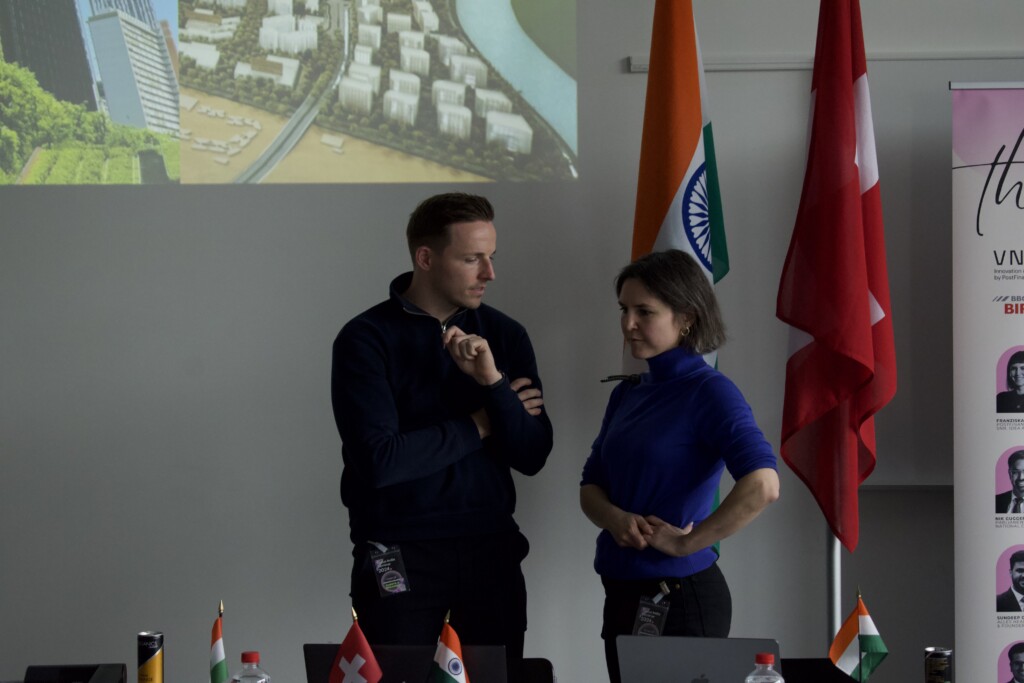 VNTR focuses on the three big problems that our planet faces. For one the death of more than 1 million species, the dependency on nature and the fact that 75% of firms are financed by banks.
VNTR focuses on the three big problems that our planet faces. For one the death of more than 1 million species, the dependency on nature and the fact that 75% of firms are financed by banks.
In the workshop with VNTR we got the task to think of a problem and then finding possible ideas for solutions. In our group we focused on air pollution in India and what we can do about it. We figured out that the air pollution comes from not only overpopulation and traffic but also from not being informed and the country not taking advantage of possible energy resources like electricity from solar power. We came up with the following five ideas.
Cable cars as public transportation: The cable cars will not only reduce noise but as we can fuel them with electricity from solar plants which will also reduce Co2 emissions.
Support private e-vehicles: As the sun is strong the production of electricity is not a big challenge in India therefore replacing vehicles that run with gas or diesel with e-vehicles for the population will also reduce noise as well as Co2 emissions. To be able to replace the vehicles there need to be bonuses for the population so that they can actually afford the change.
Solar Plants: To fuel the e-vehicles as well as the cable cars there need to be enough electricity which can be won by putting solar panels on rooftops in India. As solar panels also have a kind of isolation function it will cool down the buildings and as a side effect the buildings do not have to be cooled down as much as before which will save additional energy.
Education: Another important step is to educate the people and let them understand that there is a problem, and that change is crucial to prevent more damage to the planet and the live on earth.
In the workshop we had very little time to come up with ideas and potential solutions but the input that we can fail and that it is no problem to. Be wrong made us work in a very light and open way. We didn’t think too much about what we were writing down. But not thinking too much and just doing and saying what comes to your mind is what actually made us have good ideas because nobody was afraid to say something wrong. So, what a big takeaway from this workshop was, is that failing is ok and that you need to fail to get further and that when you accept that you are going to fail you are much more open and maybe even have better and stronger ideas.
– Written by Dena Spaar and Fabio Vizzielli, FI Delegation
Yoga Session
We had the pleasure to enjoy a yoga session by Marion Beugger at the end of our fourth seminar day. Most participants did not have a lot of previous experience with yoga exercises, but Marion was able to guide everyone equally through the different meditations as well as some light physical exercises which were adapted to our beginner level.
We started with a guided meditation in order to prepare ourselves for the upcoming class and to let go of the stress of the day. I really appreciated this part because it gave us time to calm down from our busy days and be had a moment to get a feel for our current surroundings as well as look inside us to see how we feel.
Yoga can be participated in many forms. Traditionally, yoga has its roots in the Hinduism and some parts also from the Buddhism. It is however not necessarily a religious practice but a tool for self-improvement. In the earliest practices, yoga mainly focused on mental exercises. These can be conducted for example during guided meditation and also visualizations were the focus often lies on feeling and focusing on one’s emotions and thoughts and releasing them through breathing exercises.
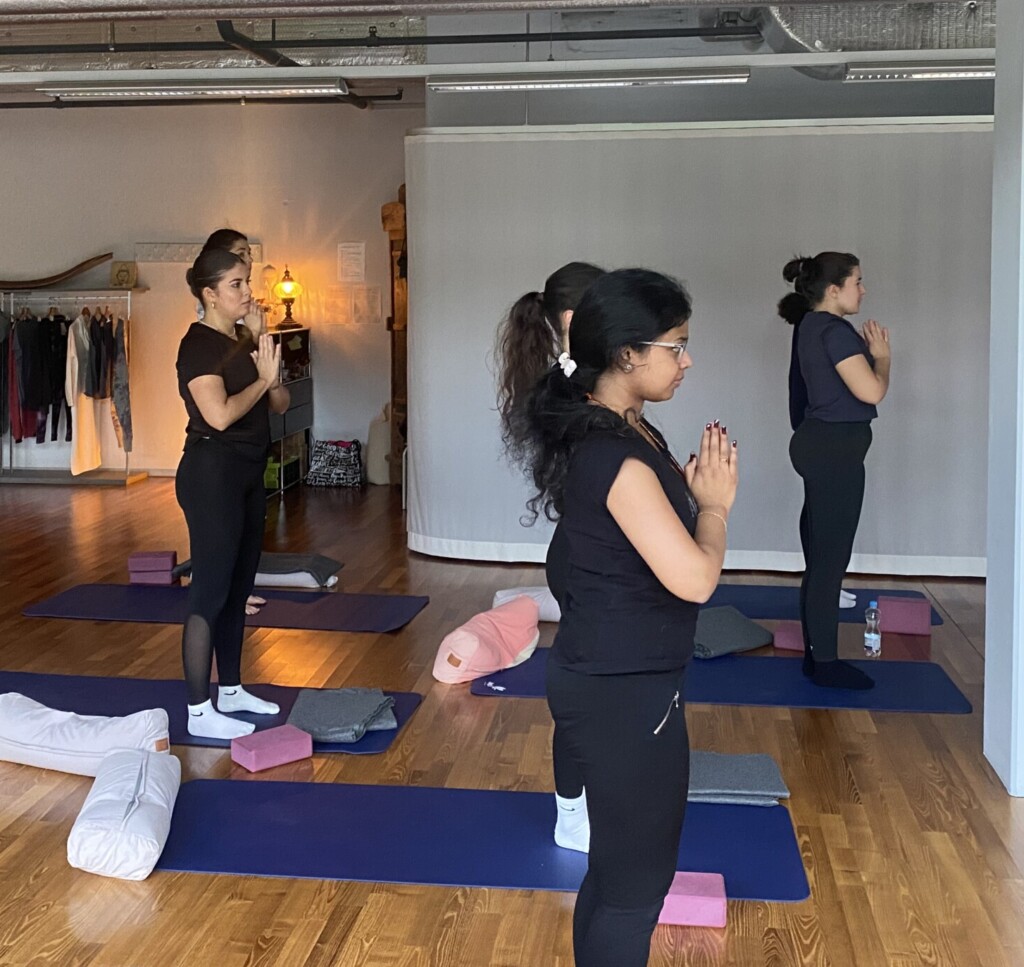 Since yoga has become more popular in the western world, a lot of practices but more weight on the physical exercises as well. Yoga is a great way for improving joint mobility, gently training the muscles, improve balance and flexibility.
Since yoga has become more popular in the western world, a lot of practices but more weight on the physical exercises as well. Yoga is a great way for improving joint mobility, gently training the muscles, improve balance and flexibility.
The goal of yoga is the same, no matter which form is practiced. It’s the holistic view of bringing balance to the body, mind and soul.
Besides the physical benefits previously mentioned, yoga also has numerous advantages for the mental health. It can greatly reduce stress and allows the participants to take the time to focus on themselves and therefore encourages reflective exercises. Tools like breathing exercises can often be used as a way to overcome strong emotions and remain collected in stressful situations. A further benefit which should not be underestimated in the currently fast paced world is a healthy sleep schedule. Yoga can also improve sleep ,whereas the mental exercises help calming the mind, and the physical exercises calming the body.
Marion chose the technique vinyasa flow yoga for our lesson. Vinyasa Yoga is a good choice for a beginner’s class since it includes easier to conduct exercises to make sure everyone can participate. The lesson altogether still included challenging parts which made the experience even more enjoyable.
– Written by Nicole, FI Delegation
Stay tuned for your further blogs about our other seminar days. Coming soon.